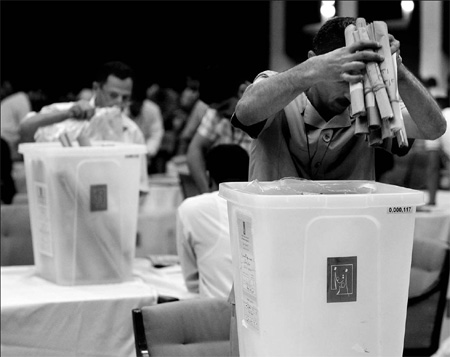Iraq begins vote recount
|
Workers do a recount of parliamentary election ballots in Baghdad on Monday. Mohammed Ameen / Reuters |
BAGHDAD - Iraqi officials began on Monday a controversial recount of the 2.5 million ballots cast in Baghdad, a move requested by Prime Minister Nouri al-Maliki who narrowly lost a parliamentary election held nearly two months ago.
Political factions have since the March 7 vote wrestled over the results, which showed a bloc led by al-Maliki coming two seats short of a rival coalition led by a secular Shiite heavily backed by Sunni Arabs.
Since no one won an outright majority in the 325-seat legislature, all parties have been involved in intense talks to cobble together a majority to form the next government.
The manual hand count, which election officials say could take two to three weeks, means further delay to an already lengthy election process that has raised fears of an increase in violence just as US troops prepare to go home.
If the recount alters the results, it could also infuriate Iraq's once-dominant Sunni Arab minority which is already wary of the Shiite-led governments in post-Saddam Hussein Iraq and what they perceive to be efforts to steal the election.
At the downtown Rasheed hotel in the walled-off Green Zone, Iraqi elections officials hauled ballot boxes onto tables in a large hall early Monday morning and issued instructions to counters on how to proceed.
Hundreds of election workers crowded into the hall and wiped the dust off the ballot boxes, which have been kept for weeks in storage. They also inspected them for any sign of tampering.
As UN monitors, officials from the Independent High Elections Commission and political party observers watched, the contents of the boxes were dumped on the tables and the counting began.
Al-Maliki, in office since May 2006, demanded recounts in five provinces after alleging fraud and irregularities but was only granted one in Baghdad, which accounts for about a fifth of parliament's 325 seats and could easily alter the razor-thin margin won by former prime minister Ayad Allawi's bloc.
Just before the recount started, election commission spokesman Qassim al-Abboudi said that the other outstanding request for a recount by the main Kurdish bloc had been withdrawn.
"Yesterday, the Kurdish alliance informed us officially of the withdrawal of their request for a recount in the provinces of Ninevah and Tamim to safeguard the national interest," he said.
Even if the recount does not swing the results in his direction, al-Maliki may still benefit from the actions of a Shiite-led commission responsible for vetting candidates for links to Saddam's regime. The commission has recommended disqualifying several of Allawi's candidates and throwing out their votes.
Al-Abboudi said the elections panel is still waiting for an appeals court's decision whether to exclude as many as nine candidates who won the election but are accused of having ties to Saddam Hussein's outlawed Baath Party.
The court has already dismissed 52 candidates, including one winner, in a Shiite-led post-election purge that Sunnis believe specifically targeted their supporters.
"If these winners are excluded, then this will affect the results of the election," al-Abboudi said.
Allawi and his supporters have warned of an effort to steal the election and last week the former prime minister called for an internationally supervised caretaker government to oversee the process of determining the election results and forming a new government.
That call was promptly rejected by al-Maliki, who says he is simply trying to make sure the election process is above suspicion.
The United Nations, the US Embassy, and the Arab League as well as Iraqi election officials have all declared the election free of systematic fraud.
Associated Press
(China Daily 05/04/2010 page11)















